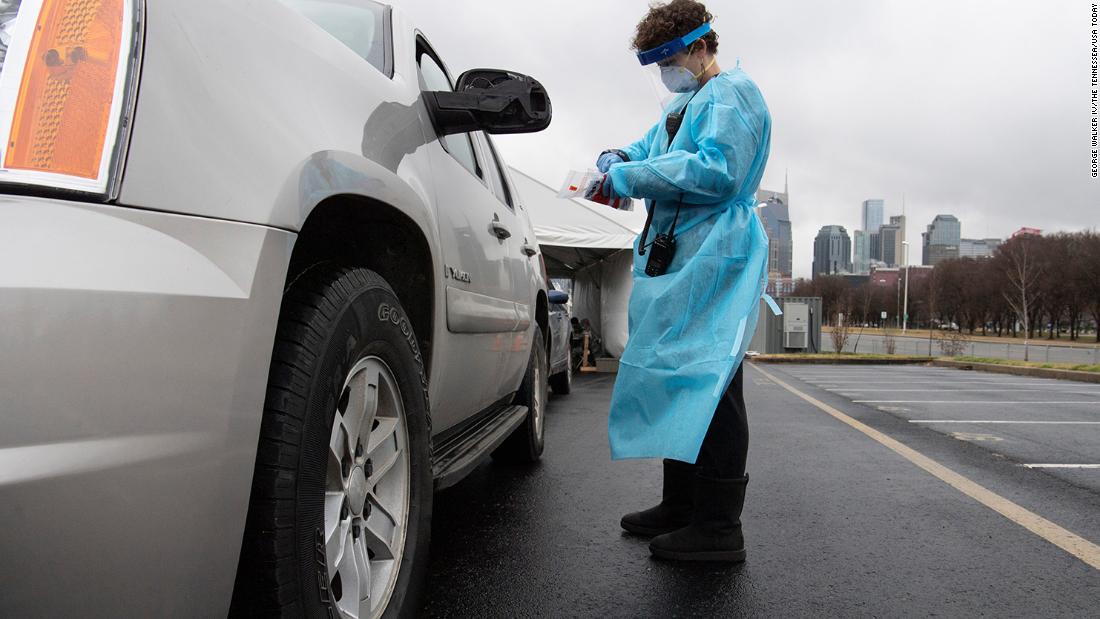“It appears to be very efficient in transmitting from person to person,” said the director of the National Institute of Allergy and Infectious Diseases to Chris Cuomo of CNN, adding that recent studies show it can be more deadly and cause more serious illnesses.
The UK variant is already on track to become dominant in hotspots like Florida and southern California “in a few weeks”, according to a testing company called Helix, which helped to identify most cases in the United States .
The only way to prevent variants from becoming dominant is to prevent them from spreading from person to person, following public health measures and vaccinating as many people as quickly as possible, said Fauci.
Fauci tweeted on Thursday his hope that the data will support coronavirus vaccination for older children in late spring or early summer.
And the Food and Drug Administration said on Thursday that it plans to use the flu vaccine update process as a model to authorize any changes to coronavirus vaccines to deal with the emergence of new variants.
“We have the possibility and the ability to try to prevent them from becoming dominant,” said Fauci.
New vaccines hope to ease burden if approved
The speed with which the variants spread compared to the speed of vaccinations will be a key factor in the number of coronavirus deaths in the coming months, according to the latest forecast from the University of Washington Institute of Health Metrics and Assessment.
New coronavirus vaccines added to the market may help to speed up the inoculation process.
The biotechnology company Novavax announced on Thursday that the “continuous review” process for authorization of its Covid-19 vaccine is underway in several countries.
The vaccine manufacturer announced that it has initiated the process with several regulatory agencies, including the U.S. FDA, the European Medicines Agency, the UK Medicines and Health Products Regulatory Agency and Health Canada. Continuous review means that the company will submit some completed sections of your application for authorization, instead of waiting until the entire application is completed.
And Johnson & Johnson officially asked the FDA for an emergency use authorization for its Covid-19 vaccine on Thursday.
The company has developed a single injection vaccine that can help reduce “the burden of disease for people worldwide and end the pandemic,” said Dr. Paul Stoffels, chief scientific officer at Johnson & Johnson, in a statement .
The FDA will hold a public meeting and, if the agency decides to authorize the vaccine, the CDC’s Immunization Practices Committee will meet to discuss whether the vaccine should be given to Americans and, if so, who should get it first.
The impulse to vaccinate teachers and return to the classroom
As some students have approached almost a year since they stepped into their classrooms, employees are eager to see a return to personal learning.
CDC director Rochelle Walensky said that with the proper distance, masking and testing, schools can safely resume on campus even before teachers are vaccinated. But many states are prioritizing teacher vaccinations.
So far, 24 states and Washington, DC are allowing some teachers or school officials to receive the vaccine.
In West Virginia, all teachers over 50 who have expressed a desire for the vaccine have already received it, according to Governor Jim Justice. In Ohio, Governor Mike DeWine outlined a plan to vaccinate all teachers by the end of February, with the goal of all students returning to classrooms by March 1.
Alabama and Colorado will include teachers among those who can be vaccinated starting on Monday.
But the availability of doses still poses a problem in many states, as officials have complained that the distribution of doses is not meeting demand.
In some cities, such as Chicago and Minneapolis, officials are at odds with teachers ‘and schools’ unions, as their effort to reopen is seen as a concern for the safety of staff, students and families. In some cases, tensions spilled over into lawsuits and threats of strikes.
Fauci promotes two doses of vaccine for those already infected
Separately, Fauci said on Thursday that even those who have had Covid-19 should be vaccinated.
“If you had Covid-19, you should still be vaccinated. As reinfection is unusual 90 days after the initial infection, you can postpone vaccination until the end of that 90-day period, if you wish. But vaccination is still safe afterwards of you recovered from Covid-19, “he said in a tweet.
Although a study earlier in the week suggested that people previously infected with the coronavirus may only need an injection of the Covid-19 vaccines, Fauci stepped back.
The authors of this prepress study, which has not been peer-reviewed, argued that changing the policy to give these individuals just one dose “would save them from unnecessary pain and release many needed doses of vaccine urgently.”
A previous infection may help initiate vaccination, said Fauci, but there is still insufficient evidence to show that it is sufficient to compare two doses for most people.
“People who have had COVID-19 must still follow the current @FDA guidance,” he said.
CNN’s Michael Nedelman, Maggie Fox, Andrea Diaz, Jacqueline Howard, Yon Pomrenze, Evan Simko-Bednarski, Elizabeth Stuart and Naomi Thomas contributed to this report.
